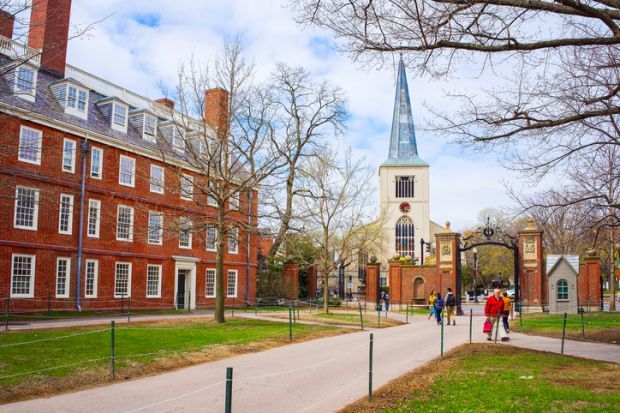Thousands of postgraduate teaching assistants have gone on strike at Harvard University, demanding better pay and improved workplace protections in their first walkout in 46 years.
Several hundred picketers representing some 4,400 postgraduate students began marching on 3 December across a snowy Harvard Yard after more than a year of talks failed to find agreement on demands that include a $25 (£19) minimum hourly wage.
Other key remaining areas of disagreement include Harvard Graduate Student Union’s call for better policies against workplace sexual harassment and discrimination, and increased healthcare coverage including mental health protection.
The strikers paraded around the office of Harvard’s president, Lawrence Bacow, shouting, “What’s up? Time’s up!”
The union said that more than 2,400 of its members, accounting for 90 per cent of ballots cast, voted to authorise the strike in October, its first since 1973.
Harvard’s administration called the strike premature, saying it was still engaged in negotiations, having already offered to boost pay by 8 per cent over three years for salaried student workers and to raise the minimum rate for hourly student workers to $15 an hour.
The union acknowledged in a position statement that obtaining the pay increase offered by the university would be “a strong outcome”, but added: “We believe Harvard should be at the forefront of providing competitive compensation to student workers.”
On benefits, Harvard has proposed $700,000 worth of increases, but the union has put a priority on expanding eligibility to more workers and bolstering mental healthcare. On workplace harassment cases, the union wants the right to outside arbitrators, while Harvard has warned that that could conflict with federal law and make the adjudication process tougher for some victims.
The strike is getting national attention for reasons beyond the Ivy League setting; key among them are the chronic concern about low pay for non-faculty teaching staff across US higher education, and the eagerness of Trump administration officials to forbid the right of graduate students to organise.
The strike immediately gained the attention of several leading presidential contenders, who offered their support to the union. They included Elizabeth Warren, a US senator and former Harvard law professor, who declared on Twitter that “all workers, including Harvard grad students, should have the right to organise and fight for better wages and working conditions”.
Despite the strike, the Harvard administration has declined so far to ask the US National Labor Relations Board to declare graduate students ineligible to form unions. The NLRB, with Trump administration appointees, is understood to be eager to issue such a ruling if any university would ask it to do so. Without such a request from Harvard or any other US university where such unions exist, the NLRB has embarked on the far slower process of drafting regulations that would have that effect.
A Harvard spokesman declined to comment on whether the institution might eventually consider resorting to NLRB involvement. Pressure on the university is relatively light for now, as the union chose to start the strike just as classes ended for the semester. The university community is now in a “reading period” before students take final exams, with classes not due to resume until late January.
The university has said it is making preparations to administer and mark exams if necessary in coming weeks, and has reminded student workers that they “should not expect to be paid for work that isn’t performed”.
“And,” Harvard’s provost, Alan Garber, wrote in an campus-wide update, “in instances where a student worker is funded through federal research dollars or other sponsored research gifts, we are obligated to track work to ensure that we comply with federal regulations and grant terms.”
Register to continue
Why register?
- Registration is free and only takes a moment
- Once registered, you can read 3 articles a month
- Sign up for our newsletter
Subscribe
Or subscribe for unlimited access to:
- Unlimited access to news, views, insights & reviews
- Digital editions
- Digital access to THE’s university and college rankings analysis
Already registered or a current subscriber? Login







